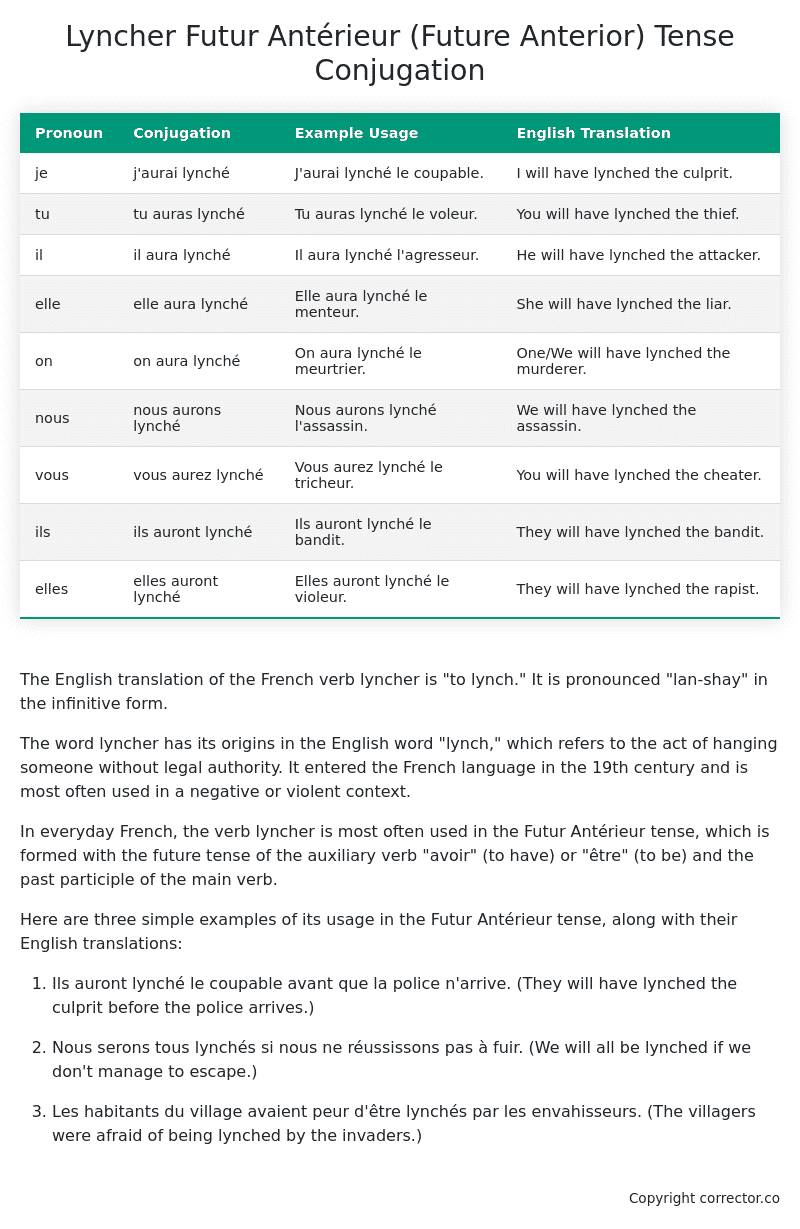Futur Antérieur (Future Anterior) Tense Conjugation of the French Verb lyncher
Introduction to the verb lyncher
The English translation of the French verb lyncher is “to lynch.” It is pronounced “lan-shay” in the infinitive form.
The word lyncher has its origins in the English word “lynch,” which refers to the act of hanging someone without legal authority. It entered the French language in the 19th century and is most often used in a negative or violent context.
In everyday French, the verb lyncher is most often used in the Futur Antérieur tense, which is formed with the future tense of the auxiliary verb “avoir” (to have) or “être” (to be) and the past participle of the main verb.
Here are three simple examples of its usage in the Futur Antérieur tense, along with their English translations:
-
Ils auront lynché le coupable avant que la police n’arrive.
(They will have lynched the culprit before the police arrives.) -
Nous serons tous lynchés si nous ne réussissons pas à fuir.
(We will all be lynched if we don’t manage to escape.) -
Les habitants du village avaient peur d’être lynchés par les envahisseurs.
(The villagers were afraid of being lynched by the invaders.)
Table of the Futur Antérieur (Future Anterior) Tense Conjugation of lyncher
| Pronoun | Conjugation | Example Usage | English Translation |
|---|---|---|---|
| je | j’aurai lynché | J’aurai lynché le coupable. | I will have lynched the culprit. |
| tu | tu auras lynché | Tu auras lynché le voleur. | You will have lynched the thief. |
| il | il aura lynché | Il aura lynché l’agresseur. | He will have lynched the attacker. |
| elle | elle aura lynché | Elle aura lynché le menteur. | She will have lynched the liar. |
| on | on aura lynché | On aura lynché le meurtrier. | One/We will have lynched the murderer. |
| nous | nous aurons lynché | Nous aurons lynché l’assassin. | We will have lynched the assassin. |
| vous | vous aurez lynché | Vous aurez lynché le tricheur. | You will have lynched the cheater. |
| ils | ils auront lynché | Ils auront lynché le bandit. | They will have lynched the bandit. |
| elles | elles auront lynché | Elles auront lynché le violeur. | They will have lynched the rapist. |
Other Conjugations for Lyncher.
Le Present (Present Tense) Conjugation of the French Verb lyncher
Imparfait (Imperfect) Tense Conjugation of the French Verb lyncher
Passé Simple (Simple Past) Tense Conjugation of the French Verb lyncher
Passé Composé (Present Perfect) Tense Conjugation of the French Verb lyncher
Futur Simple (Simple Future) Tense Conjugation of the French Verb lyncher
Futur Proche (Near Future) Tense Conjugation of the French Verb lyncher
Plus-que-parfait (Pluperfect) Tense Conjugation of the French Verb lyncher
Passé Antérieur (Past Anterior) Tense Conjugation of the French Verb lyncher
Futur Antérieur (Future Anterior) Tense Conjugation of the French Verb lyncher (this article)
Subjonctif Présent (Subjunctive Present) Tense Conjugation of the French Verb lyncher
Subjonctif Passé (Subjunctive Past) Tense Conjugation of the French Verb lyncher
Subjonctif Imparfait (Subjunctive Imperfect) Tense Conjugation of the French Verb lyncher
Subjonctif Plus-que-parfait (Subjunctive Pluperfect) Tense Conjugation of the French Verb lyncher
Conditionnel Présent (Conditional Present) Tense Conjugation of the French Verb lyncher
Conditionnel Passé (Conditional Past) Tense Conjugation of the French Verb lyncher
L’impératif Présent (Imperative Present) Tense Conjugation of the French Verb lyncher
L’infinitif Présent (Infinitive Present) Tense Conjugation of the French Verb lyncher
Struggling with French verbs or the language in general? Why not use our free French Grammar Checker – no registration required!
Get a FREE Download Study Sheet of this Conjugation 🔥
Simply right click the image below, click “save image” and get your free reference for the lyncher Futur Antérieur tense conjugation!

Lyncher – About the French Futur Antérieur (Future Anterior) Tense
Construction
Common Everyday Usage Patterns
Interactions with Other Tenses
For example
Summary
I hope you enjoyed this article on the verb lyncher. Still in a learning mood? Check out another TOTALLY random French verb conjugation!


